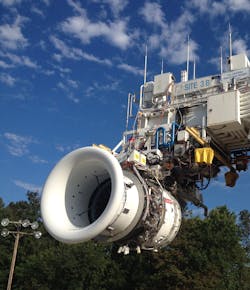CFM launches a new era as first LEAP engine begins ground testing
WEST CHESTER, Ohio — 6 September 2013 — CFM International has initiated testing of the first full LEAP engine, launching an extensive ground and flight test certification program that will encompass 60 engine builds over the next three years. The program will culminate in engine certification in 2015 and first entry into commercial service on the Airbus A320neo in 2016.
The LEAP-1A engine, which is the powerplant for the Airbus A320neo, fired for the first time on September 4th, two days ahead of the schedule. After a series of break-in runs, the engine was operating smoothly and has reached full take-off thrust.
“In the past five years, we have completed thousands of hours of component testing leading up to this day,” said Chaker Chahrour, executive vice president of CFM International. “Everything we have seen tells us the LEAP engine is going to deliver all we promised, and much more. Now, we get to put it through its paces in the most comprehensive test program we have ever undertaken. By the time this engine enters services, we will have simulated more than 15 years of airline service with 60 different engine builds.”
The engine, which shares common turbomachinery with the LEAP-1C, is installed at Site 3B at GE’s Peebles, Ohio, outdoor test facility, where it will be on test for the next several weeks. The overall certification program, which encompasses all three LEAP engine variants, includes 28 ground and CFM flight test engines, along with a total of 32 flight test engines for Airbus, Boeing, and COMAC. Over the next three years, these engines will accumulate approximately 40,000 hours (18,000 engine cycles) leading up to entry into service.
“This is an exciting day for us,” said Cédric Goubet, executive vice president for CFM. “We are very proud of the fact that we have had 21 entries into service in our history; each of them was as on time and met all the specifications. From everything we have seen so far, the LEAP program is going to maintain that record.
”We believe we have the best team in aviation. Today, we thank each member for their tireless dedication to this project and congratulate them for the phenomenal job they have done in keeping this program on schedule. In fact, the first engine to test was actually two days ahead of the planned target to fire date we set nearly three years ago.”
CFM officially launched the LEAP engine, which is the company’s first all-new centerline engine in nearly 40 years, in 2008. The engine was being designed to bring double-digit improvements in fuel efficiency, emissions and noise, while maintaining the legendary reliability and low cost of ownership of its predecessor, the ubiquitous CFM56 engine family.
At the time of the launch, there was no specific aircraft application. However, in 2009 COMAC chose the LEAP-1C engine as the sole powerplant for the C919 in 2009; Airbus followed in 2010 when it selected the LEAP-1A engine as an option on the A320neo family; and in 2011, Boeing selected the LEAP-1B as the sole powerplant for its new 737 MAX.
The foundation of the LEAP engine is heavily rooted in advanced aerodynamics, environmental, and materials technology development programs. It will provide 15 percent better fuel consumption and an equivalent reduction in CO2 emissions compared to today’s best CFM engine, along with dramatic reductions in engine noise and emissions. All this technology brings with it CFM’s legendary reliability and low maintenance costs.
About CFM International
CFM International, a 50/50 joint company between Snecma (Safran) and GE, is the world's leading supplier of commercial aircraft engines, has delivered more than 25,000 engines to date. The LEAP-1A engine has been selected to power more than 800 A320neo aircraft, which represents more than 50 percent of the orders announced to date for which an engine selection has been made.


